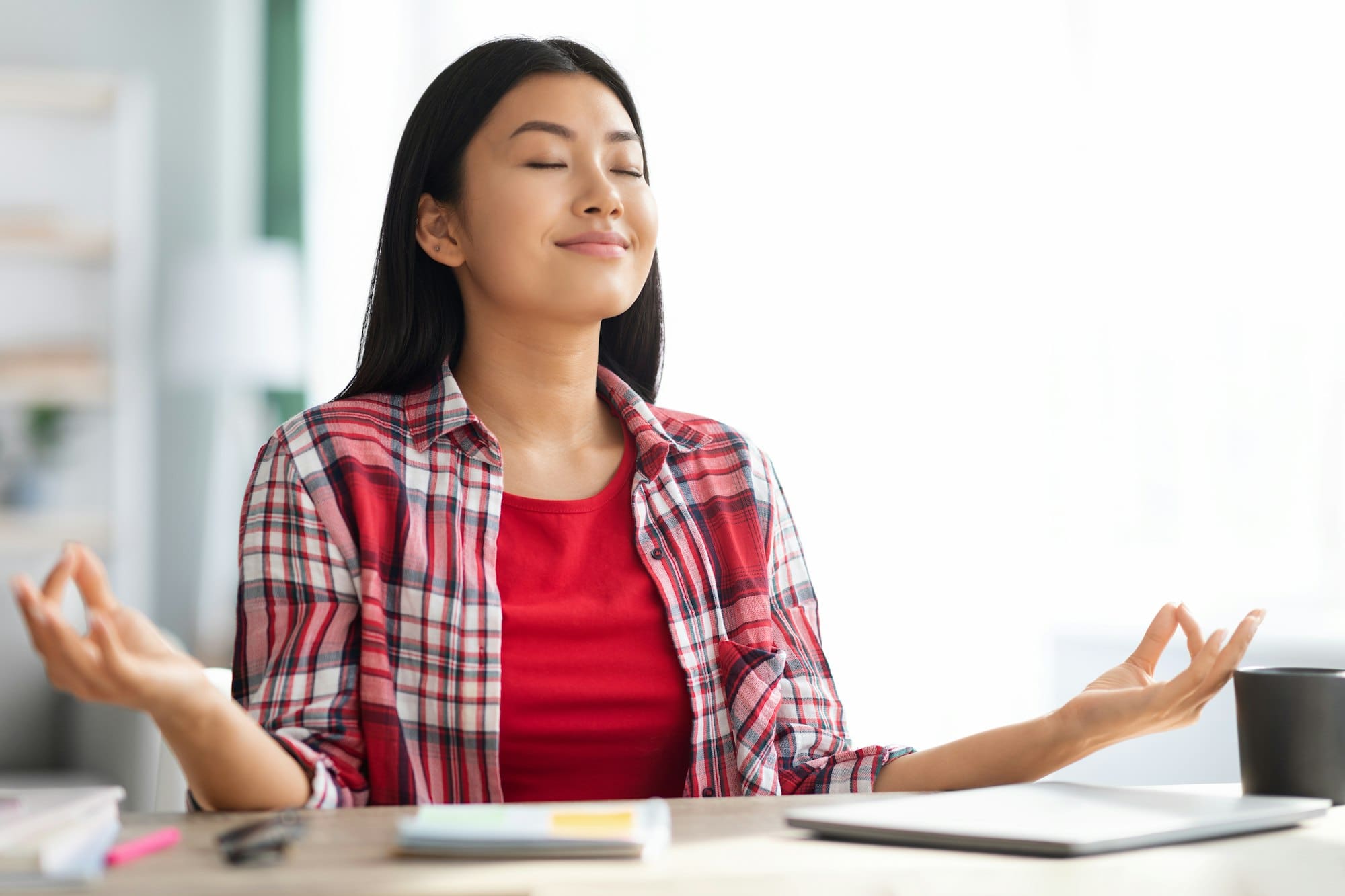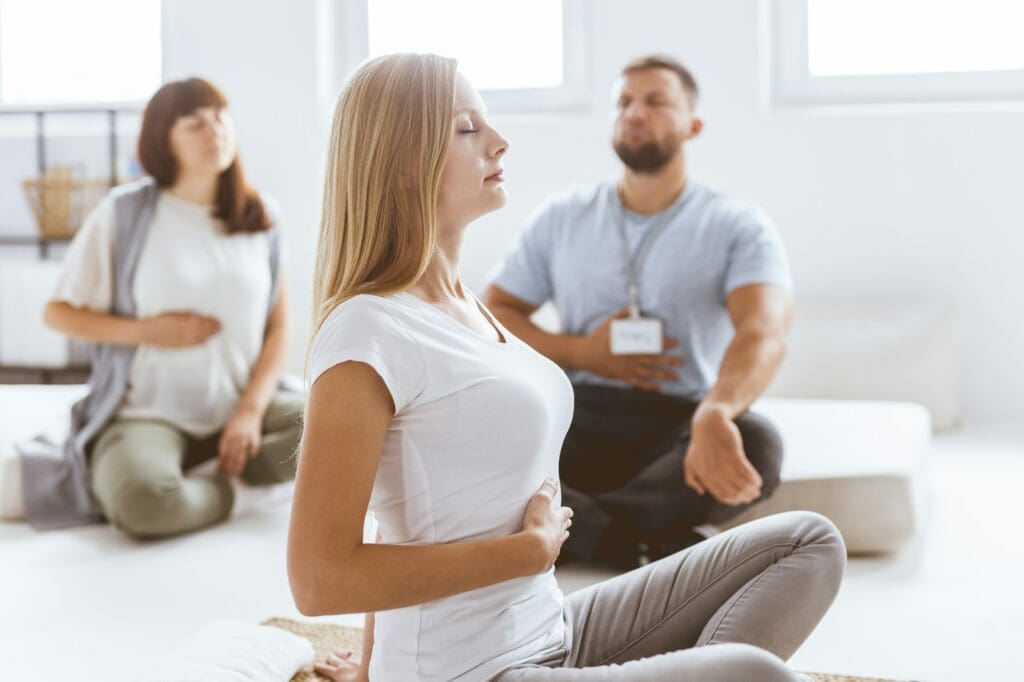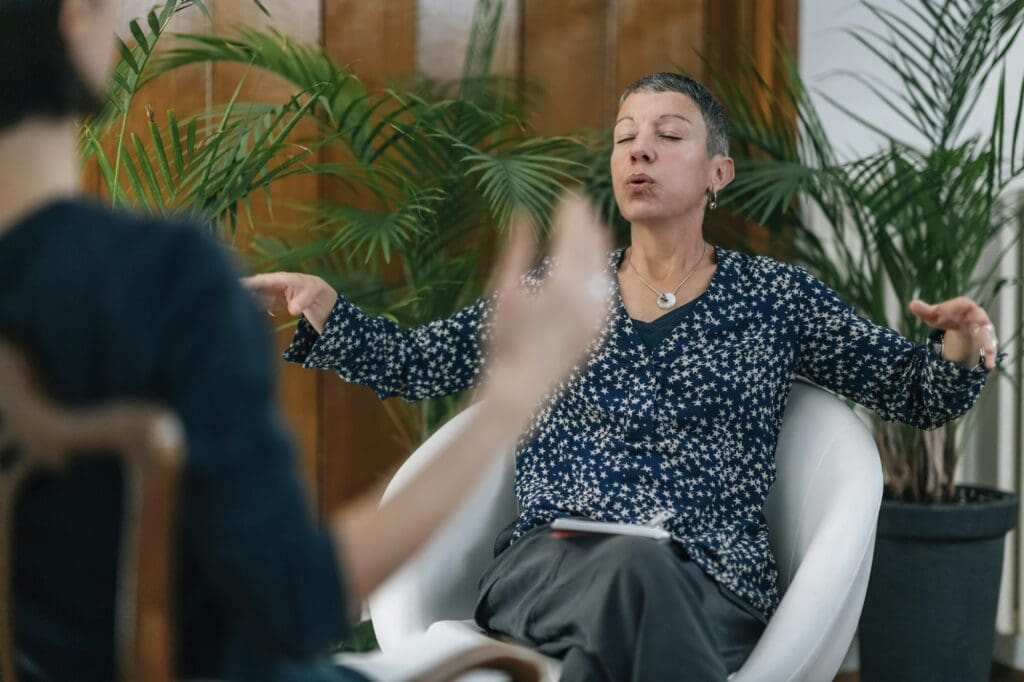


Feeling overwhelmed by the pressures of daily life? You’re not alone. Anxiety and stress are common challenges that many people face.
However, managing these feelings doesn’t have to be difficult or overwhelming. In this article, we’ll explore some effective ways to help you reduce your stress and anxiety, enabling you to lead a calmer, more balanced life.
Consider the words of American author and speaker, Dale Carnegie:
“Our fatigue is often caused not by work, but by worry, frustration, and resentment.”
Ready to discover practical strategies that can make a real difference? Let’s dive in!

Creating a relaxing environment is essential for managing anxiety and stress. Your surroundings have a profound impact on your mental and emotional well-being. Here’s how you can transform your space:
1. Declutter Your Space: A cluttered environment often leads to a cluttered mind. Spend some time decluttering your home or workspace. Keep only what you need and love, and let go of the rest. This can create a sense of order and calm.
2. Use Calming Colors: Colors like blue, green, and soft earth tones have a calming effect. Consider repainting your walls or adding decor items in these hues to create a more serene atmosphere.
3. Incorporate Natural Elements: Nature has a calming effect on the mind. Add indoor plants, fresh flowers, or even a small water fountain to bring a bit of the outdoors inside. These elements can help reduce stress and promote relaxation.
4. Adjust the Lighting: Harsh lighting can contribute to stress. Opt for soft, warm lights instead. Use lamps, string lights, and candles to create a cozy, inviting ambiance.
5. Create a Dedicated Relaxation Area: Designate a specific spot in your home for relaxation. It could be a comfy chair with a soft blanket, a corner with your favorite books, or a space for meditation and mindfulness practice. Make it a stress-free zone where you can unwind.
Remember: Creating a relaxing environment is about making small, intentional changes that resonate with you personally. By tailoring your space to support relaxation, you’ll find it easier to manage anxiety and stress in your day-to-day life.
Recognizing your personal triggers is a crucial step in managing anxiety and stress effectively. A trigger can be anything that causes a surge of anxiety, and it often varies from person to person.
Common triggers might include work pressure, social situations, financial concerns, or even specific environments. To start, consider keeping a journal.
Document situations that cause your stress and anxiety, noting the circumstances and your reactions. Over time, patterns may emerge, helping you identify consistent triggers.
Once you’ve identified your triggers, the next step is to employ strategies to either avoid or manage them. Awareness is key.
For example, if social gatherings make you anxious, you might limit your exposure by declining unnecessary invitations or planning to leave early.
Alternatively, you can prepare yourself with calming techniques such as deep breathing or positive visualization.
Learning to say no is another vital skill. Feeling overcommitted is a common trigger for stress. By prioritizing your responsibilities and declining additional tasks that overwhelm you, you can maintain better control over your mental well-being.
Remember, it is perfectly okay to set boundaries.
Additionally, adopting mindfulness practices can be particularly helpful. According to The Mindfulness Solution: Everyday Practices for Everyday Problems, mindfulness helps you stay present and reduces the overthinking that often accompanies stress and anxiety.
By focusing on the current moment and accepting your feelings without judgment, you can diminish the power your triggers hold over you.
Ultimately, the goal is not to eliminate every single trigger but to recognize them and respond in a healthier way. Through self-awareness and deliberate action, you can create a more manageable and less stressful life.

Feeling overwhelmed by anxiety can be exhausting. It’s those moments when your heart races, palms sweat, and thoughts spiral uncontrollably.
This is where the power of your breath comes in—serving as an incredibly effective, immediate relief tool that you can use anytime, anywhere. Learning specific breathing techniques can help you regain control, calm your mind, and bring a sense of peace in just a few minutes.
Journaling can be a powerful tool for managing stress. When you put your thoughts and feelings down on paper, you’re giving yourself a chance to process them.
This can help clarify what’s bothering you and lead to insightful solutions. It’s a way to release pent-up emotions, providing a cathartic experience that can lighten your emotional load.
One effective journaling technique is the brain dump. When you feel overwhelmed, take a few minutes to write down everything that’s on your mind—no filtering or organizing. Just let it all out. This can create a sense of relief and make your worries seem more manageable.
Another approach is gratitude journaling. Each day, write down a few things you’re grateful for. This simple practice can shift your focus from stressors to positive aspects of your life, promoting a more balanced perspective.
It’s a reminder that amidst the chaos, there are still things to appreciate.
If structured journaling suits you better, consider the following prompts:
These prompts can guide your thoughts constructively, transforming vague anxiety into actionable plans. Remember, the goal of journaling isn’t to produce polished writing but to foster self-understanding and emotional resilience.
So, grab a notebook and start exploring your thoughts—your mental health will thank you.

Reducing your intake of caffeine and alcohol can have a significant positive impact on your anxiety and stress levels. While these substances might offer temporary relief or a quick energy boost, they can exacerbate your symptoms in the long run.
Caffeine is a stimulant that can increase your heart rate and blood pressure, leading to heightened feelings of anxiety and restlessness.
If you find yourself more jittery after that cup of coffee or energy drink, it might be time to cut back. Consider swapping caffeinated beverages for alternatives such as herbal teas, which can promote relaxation without stimulating your central nervous system.
Alcohol, on the other hand, is a depressant that affects the central nervous system. While it might seem to calm your nerves initially, it can disturb your sleep and increase your feelings of stress and anxiety once its effects wear off.
Gradually lowering your alcohol consumption or seeking alternatives for winding down can help manage your anxiety more effectively.
If giving up these substances completely feels daunting, start small. Try limiting intake to specific times of day or reducing the quantity step by step. Monitoring how your body and mind respond to these changes can provide insight and motivation to continue on this healthier path.
Remember, your journey towards managing anxiety and stress is unique to you. Being mindful of how different substances affect you is a crucial part of developing a sustainable and effective self-care routine. You’ve got this!

Recognizing when it’s time to seek professional help can make a significant difference in managing anxiety and stress. Professional help can come in many forms, whether it’s through therapy, counseling, or medical intervention.
Sometimes, these forms of anxiety or stress can be too intense or pervasive to manage on your own, and that’s okay. Seeking help is a sign of strength, not weakness.
Types of Professional Help:
It’s important to remember that there’s no one-size-fits-all approach to managing anxiety and stress. What works for one person might not work for another.
The key is to find what works best for you, and sometimes that might involve trying a few different methods before finding the right fit.
When to Seek Professional Help:
Ultimately, seeking professional help can provide you with the tools and support necessary to better manage anxiety and stress, helping you lead a healthier, happier life.
There are several natural remedies that can help alleviate anxiety and stress:
Creating a daily routine can serve as a powerful ally in your fight against anxiety and stress. The key is to include elements that promote well-being and calm.
Start your day with a 15-minute mindfulness practice. This simple habit can clear your mind and set a positive tone for the day. Following this, consider a balanced breakfast to fuel your body and brain.
Engaging in consistent physical activity, like walking or yoga, can significantly reduce stress levels. Next, incorporate breaks throughout your workday to breathe deeply and recenter. In the evening, practice a relaxation technique, such as progressive muscle relaxation, to unwind.
Before bed, keep a journal to reflect on your day and release any lingering stressors. Ending the day with a calming routine can improve your sleep quality and overall well-being.
Absolutely, journaling can be a powerful tool in managing anxiety and stress. By dedicating time to jot down your thoughts and feelings, you create an outlet for processing emotions. Journaling provides a way to organize your thoughts and identify patterns in your anxiety triggers.
Regularly writing about your experiences can help you gain insights into your stressors and challenge negative thought patterns. It allows you to articulate feelings that might be difficult to express otherwise, providing clarity and a sense of control.
Some people find it helpful to write about stressful events to process them better, while others might prefer to focus on what they’re grateful for, which can help shift the mind towards positive thinking.
Moreover, research supports the benefits of expressive writing. Studies have shown that it can reduce symptoms of anxiety and stress, improve mood, and even enhance overall mental health.
So grab a notebook, set aside a few minutes each day, and start exploring your thoughts. Your mind will thank you!
Absolutely, meditation can be an effective tool for managing anxiety and stress. By practicing mindfulness meditation, you can train your mind to focus on the present moment, reducing the grip that anxiety and stress often have on our lives. But how do you start?
First, find a quiet place where you won’t be disturbed. Sit comfortably, whether that’s on a chair, cushion, or even lying down. Close your eyes and take a few deep breaths to center yourself.
As you breathe in and out, start to pay attention to the sensation of your breath. This could be the rise and fall of your chest or the feeling of air passing through your nostrils.
If you find your mind wandering—and it likely will—that’s okay. When you notice it, gently guide your focus back to your breath.
The goal isn’t to stop your thoughts entirely but to continually return your focus to the present moment. Start with just 5 minutes a day and gradually increase the time as you become more comfortable.
For those looking for more structured guidance, consider using a meditation app. There are numerous apps designed to guide you through mindfulness meditation, making it accessible anywhere, anytime.
So yes, meditation can help with anxiety and stress, and starting is as simple as dedicating a few minutes each day to practice.
No matter where you are in your journey with anxiety and stress, remember that taking proactive steps can make a significant difference.
The techniques outlined in this article—from creating a relaxing environment to seeking professional help—are all valuable tools to help you regain a sense of calm and control.
Implementing these strategies may take time and patience, but the potential benefits far outweigh the effort. Engage with practices that resonate with you, and don’t hesitate to explore multiple options until you find what works best.
It’s essential to acknowledge that managing anxiety and stress is not a one-size-fits-all proposition.
If you ever feel overwhelmed, know that it’s okay to ask for help. There are numerous resources and professionals ready to support you in this journey.
Remember, self-care is not a luxury but a necessity. Prioritizing your mental health can lead to better overall well-being, improved relationships, and even greater academic or professional success.
Take the first step today. Incorporate one or two techniques into your daily routine and observe the changes. Over time, you’ll develop a personalized toolkit that empowers you to effectively manage anxiety and stress.
In the end, this journey is about finding balance and creating a life where you can thrive.









